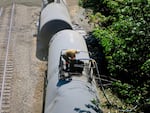
Cleanup efforts continued on Monday, June 6, 2016, at the site of an oil train derailment in Mosier, Oregon.
Conrad Wilson / OPB
Union Pacific confirmed Tuesday it won’t be sending trains of crude oil through Mosier, Ore., until derailed cars there are cleared, the crash has been investigated and the town has adequate notice.
On Monday, a Union Pacific spokeswoman said the lack of oil trains through Mosier was simply the result of railroad scheduling, not a railroad decision to halt shipments through the town.
"We don't run very many crude oil trains through here," she said. "Again, remember crude oil is 1 percent of the shipments that we carry."
However, on Tuesday, Union Pacific's Justin Jacobs said it was more than scheduling.
"We don't have any scheduled, but on top of that we will not run new crude oil trains through the gorge until after this incident has been fully investigated and we inform the community," Jacobs said.
But the railroad hasn't stopped moving other hazardous and flammable materials through the town — including tanker cars of liquefied petroleum gases like propane or butane.
“We have hundreds of thousands of customers throughout our network that rely on us to get our commodities to them. Operations have resumed on our lines here,” Jacobs said. “We are running mixed manifest trains, auto racks, things of that nature.”
The railroad is currently operating at a reduced speed of 10 mph through Mosier while crews work to drain and clear the 16 tanker cars that derailed June 3, resulting in a spill and explosion.
“After putting in this track, we conducted multiple inspections,” Jacobs said. “The unified command here, part of multiple agencies working together, they have deemed it safe.”
Leaders in Mosier have objected to Union Pacific’s plan to run trains through the town while derailed tanker cars lie feet from the tracks. Oregon leaders have called for a moratorium on oil trains through the area.
“Restarting trains before the high-risk carnage of their last accident is even cleared from the tracks is telling Mosier they are going to play a second round of Russian roulette without our town — it’s totally unacceptable,” Mosier Mayor Arlene Burns said in a statement Monday.
Dave Byers of the Washington Department of Ecology said he expected all the remaining oil will be pumped out of the derailed cars before Wednesday.
By Tuesday, crews had removed about 65 truckloads. About 25 remained. The oil is being transferred to The Dalles, where it will be prepared for rail transport to its original destination in Tacoma, Wash.
Officials estimate 42,000 gallons of crude escaped from the cars in the wreckage. An estimated 10,000 of those were removed from the wastewater system, while the rest either burned, seeped into the soil or leaked into the Columbia River, where it’s been captured by boom.
Conrad Wilson contributed reporting.
